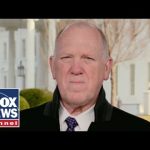The recent fiery debate between a Democratic strategist and a conservative host epitomized the stark ideological divide shaping American politics today. The discussion, centered on the Democratic Party’s struggles and Donald Trump’s leadership, underscored the challenges facing Democrats as they attempt to redefine their identity in the wake of significant electoral losses. Meanwhile, conservatives, emboldened by Trump’s second term, continue to champion policies they argue align more closely with the priorities of everyday Americans.
The conservative host wasted no time highlighting Trump’s achievements, from deregulation to border security, contrasting them with what he described as the Democrats’ chaotic and misguided agenda. He accused the left of prioritizing fringe social issues over pressing concerns like inflation, immigration, and national security. This critique resonates with many conservatives who see Trump’s policies as a return to common-sense governance, particularly in areas like energy independence and fiscal responsibility. The host’s assertion that Democrats are out of touch with working-class voters reflects a broader sentiment among Republicans that their party has successfully positioned itself as the voice of middle America.
The Democratic strategist, however, countered by emphasizing the importance of healthcare and economic opportunity, arguing that these remain central to the Democratic platform. He pointed to polling data suggesting potential gains in upcoming elections and called for a more measured approach in opposing Trump. Yet this strategy reflects deeper tensions within the Democratic Party. As reports indicate, Democrats are grappling with internal divisions over how to address their declining appeal among key demographics such as Latino voters and working-class Americans. The strategist’s nostalgia for bipartisan cooperation further highlighted a yearning for an era when political discourse was less polarized—an aspiration that seems increasingly out of reach.
This disarray within the Democratic Party stems from its inability to reconcile progressive policies with the concerns of mainstream voters. The host quipped that Democrats need a “new playbook,” suggesting their focus on identity politics and climate initiatives alienates many Americans struggling with day-to-day challenges. This aligns with recent analyses showing that Republicans have made significant inroads with non-college-educated voters and Hispanics—groups once considered Democratic strongholds. For conservatives, these shifts signal a rejection of what they see as elitist priorities disconnected from the realities of most Americans.
The debate also touched on Trump’s leadership style, with the strategist criticizing his divisive rhetoric while acknowledging his effectiveness in consolidating Republican support. Interestingly, he lamented Ukrainian President Volodymyr Zelenskyy’s criticisms of Trump, suggesting they could undermine potential diplomatic solutions—a point that underscores how even international dynamics intersect with domestic political strategies. Meanwhile, the host doubled down on Trump’s America-first agenda, framing it as a necessary corrective to years of globalist policies that he argued weakened U.S. sovereignty and economic strength.
Ultimately, this exchange mirrored broader national debates about the future of American politics. While conservatives rally around Trump’s assertive approach to governance, Democrats face an existential crisis over how to rebuild their coalition and regain public trust. The host’s insistence on accountability and prioritizing American interests over ideological experiments resonated as a call for pragmatism in addressing the nation’s challenges. As both sides continue to clash over competing visions for America’s future, one thing is clear: the battle for the soul of American politics is far from over.




